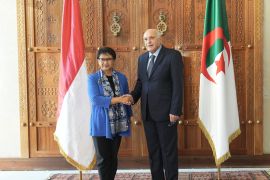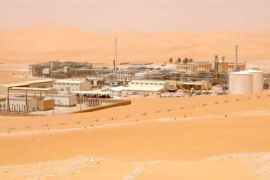"I address myself to you in this letter in a particularly delicate and dangerous context," the former secretary general of the National Liberation Front, in power since independence in 1962, said.
His letter published by the press accused the regime of being "incapable of solving the thorny problems of our country, which are multiple and complex, and even less so of preparing efficiently for the challenges of the future, which are even more arduous and serious."
"The central question, which calls for a global and organised national effort, is that of setting up a regime that is truly democratic," said Mehri, 85, who is also a former minister and and ambassador to France.
Mehri demanded the liberation of "large social categories trapped in the circle of exclusion and marginalisation."
Also on Thursday, a powerful opposition coalition announced that it would be going ahead with a protest march planned to take place Saturday in Algiers, in spite of concessions by the prime minister, who on Wednesday reiterated the government`s readiness to lift a state of emergency within weeks.
"Algeria is really on the road towards change. Our struggle goes well beyond the lifting of the state of emergency," said Fodil Boumala, a founder member of the National Coordination for Change and Democracy (CNCD), which groups the political opposition, the Algerian human rights league and trade unions.
"The next demonstration on Saturday is being prepared very well. There is less fear," added Boumala. A previous demonstration in the capital on February 12 had gathered some 2,000 people in defiance of a ban.
CNCD officials announced a similar march in the western coastal city of Oran, where they said the authorities had refused their request to meet in the big Saada Hall.
"We will go on the day to the hall to hold our meeting. It`s up to officials who refused to give us a hall to accept their responsibilities," said the CNDC representative for Oran, Kaddour Chouicha.
Boumala said that at the same time as announcing the imminent lifting of the state of emergency, which has been in force since 1992, Prime Minister Ahmed Ouyahia`s government was "preparing an anti-terrorist law which will perhaps be more dangerous."
The state of emergency was initially declared to combat a hardline Islamist insurgency which claimed more than 150,000 lives in a decade.
Boumala rejected Ouyahia`s proposals, which included measures to provide better housing and combat employment, as "pseudo solutions to structural crises. (*)
Editor: Kunto Wibisono
Copyright © ANTARA 2011








